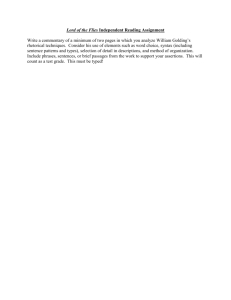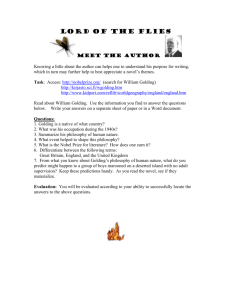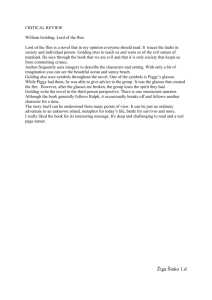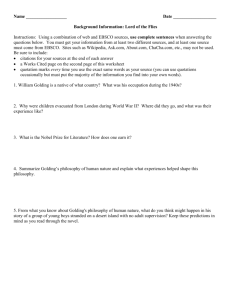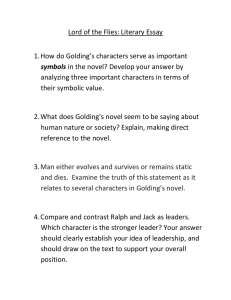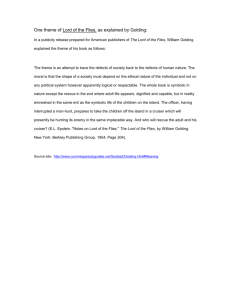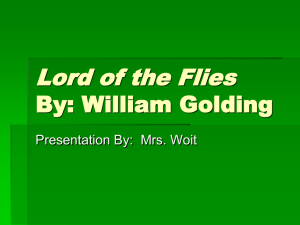Lord of the Flies
advertisement
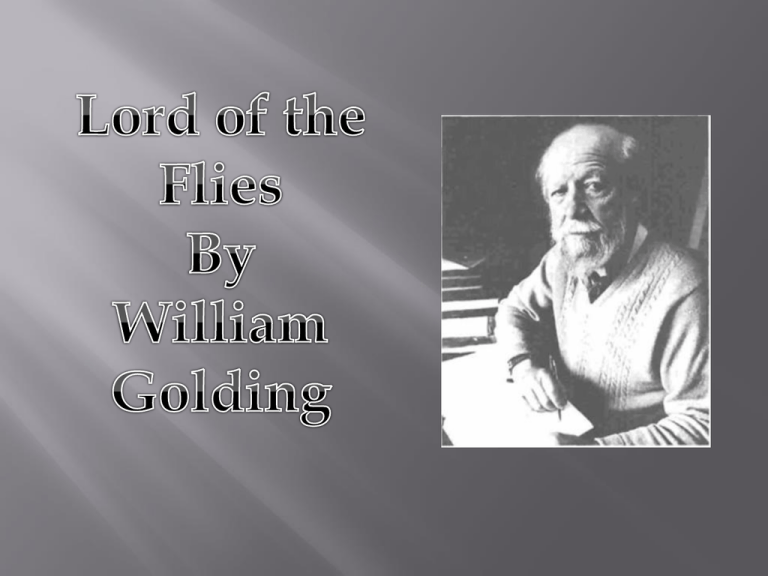
William Golding was born in Cornwall, England in 1911 He was the son of an English schoolmaster who believed strongly in science and rational thought. He was raised in the sheltered environment of an English private school The prevailing concept of man and society at that time, before World War II, included two basic viewpoints: Man was essentially good Society was inherently evil Growing up, Golding read adventure stories: These stories featured good and pure men in their struggle against the evils of society. After two years in college Golding switched majors from Science to English This marked the beginning of his disillusionment with his father’s rationalism—the practice of guiding one’s actions and opinions solely by what seems reasonable He graduated from Brasenose College, Oxford, in 1935 with a degree in English Golding joined the British Royal Navy in 1940 He was unprepared for the violence unleashed by war He witnessed firsthand the destructive power of man operating during war, essentially outside the restrictive limits of society Those experiences with chaos, fear, death, and destruction on a massive scale during World War II altered his moral philosophy Golding was present at the sinking of the Bismarck, the Walcheren Operation, and DDay landings in France He later described his experience in the war as one in which “one had one’s nose rubbed in the human condition” “When I was young, before the war, I did have some airy-fairy views about man…But I went through the war and that changed me.” With war as his tutor, Golding began to view man as a creature with a very dark and evil side to his nature. The German air force bombing had devastated the England Golding retuned home to. The nations infrastructure was severely damaged. This marked the beginning of a serious decline in the British economy. Wartime rationing continued well into the postwar period. Meat, bread, sugar, gasoline, and tobacco were all in short supply and considered luxuries. Key industries, such as coal, electric power, gas companies and the transportation industry were nationalized in an attempt to turn the economy around. Socialized medicine and government-sponsored insurance were introduced. Political Climate of the 1950’s A new phase of world geopolitics began after World War II Cold War existed between the Iron Curtain of the communist countries of Eastern Europe and the Soviet Union and the Free World of Western Europe and the United States. The atmosphere of the first half of the 1950’s was one of distrust, suspicion, and threats among the big powers of the time. November 1, 1952, the United States successfully tested a hydrogen bomb at Eniwetok Atoll in the Pacific March 1, 1954, a device hundreds of times more powerful than the atomic bombs dropped on Japan was tested at Bikini Atoll. In the United States, fallout shelters were designated for large cities to protect citizens from the rain of radioactive materials. School children practiced taking cover under their desks during regular air raid drills. In 1954 Canada and the United States agreed to build a “DEW” line (Distant Early Warning Line) of radar stations across the Arctic to warn of approaching aircraft of missiles over the Arctic. An atomic war on the scale that Lord of the Flies suggests did not seem out of the realm of possibility during the early 1950’s. Against this historical background and William Golding’s personal experiences, after reading a bedtime boys’ adventure story to his children, Golding wondered out loud to his wife whether it would be a good idea to write such a story but to let the characters “behave as they really would.” She thought it would be, and Golding wrote Lord of the Flies. Coral Island R.M.Ballantyne, 1858 Ralph, Jack and Peterkin, deserted on a coral island in the Pacific, work hard together to save themselves. The only evil is external and personified by a group of cannibals that live on the island. This book expresses the Victorian World View that through hard work and serious intent, one can overcome any hardship. The boys survive and return to England with strengthened morals and sharpened wit. Allegory: the expressions through symbolism of truths or generalizations about human experience Parable: a simple story told to illustrate a moral truth •Satire: biting wit, irony or sarcasm used to expose a vice or folly •Parody: A literary or musical work that imitates the style of some other work in a satirical or humorous way. Lord of the Flies is an allegorical novel: Golding conveys his main ideas and themes through symbolic characters and objects. It is an allegory of politics, human psychology and religion. It is a satirical imitation of the Victorian “World View.” It is a parody of Coral Island.
